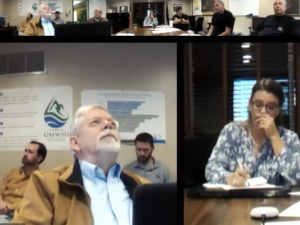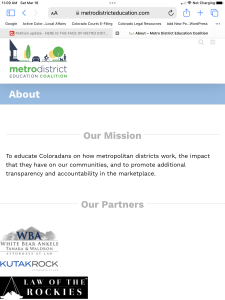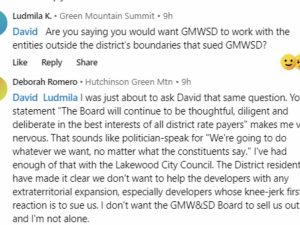The apparent leader of the Green Mountain Water and Sanitation District new majority – Dave Garner – admonished the public that Green Mountain will not be transparent when it comes to the Big Sky litigation:

Here is the full tape – his comments begin about 1:44:33 and is cued up here (click or tap the screen to get the arrow and click or tap the arrow)
https://youtu.be/Udq8Kc0x9Xo?si=kfUai6CV25bb_jNF
Here is another break out of what he had to say in three one minute clips:
https://youtube.com/clip/UgkxQNG_Eq_kS6BcKqrE9GrptEywZiwynoJ-?si=S78Y-0e6SOMLCwra
https://youtube.com/clip/UgkxtuhGAP3jWJWp_fvglkCcnpLpLiEJ1lgn?si=kn4p0tKKnvI49CFX
https://youtube.com/clip/UgkxvNWiEtlwOjPxrX7IEPcz7B0n5WzdcdTS?si=PwqPUIGR-cxrr5at
Now, to be sure, the board should respect the attorney client and work product privileges that apply. The board can always waive those privileges to share some information. But generally what the attorney says to them and what they say to the attorney in defending litigation should remain private.
But Garner’s brush is far too broad. Information that either came from the Big Sky plaintiffs or information the board has already shared with the Big Sky plaintiffs is no longer privileged.
- “Telling the plaintiffs how to win” is different from
- sharing with the public what the plaintiffs are saying and what the board and their attorney are saying to the plaintiffs.
For example. Forfeiting the jury trial.
It would have been nice for the board to disclose that issue and potential decision before it was filed with the court.
- The plaintiffs asked for it and knew about it before the public did (waive the jury trial). It wasn’t privileged but it wasn’t shared with the public.
- The board (through their attorney) discussed it with the plaintiffs but not the public. It wasn’t privileged but it wasn’t shared with the public.
- The board decided to forfeit it and told the plaintiffs before the public. It wasn’t privileged but it wasn’t shared with the public.
Public input on that important decision might have made a difference in the board’s decision.
Same goes for the decision – discussed with the plaintiffs but not with the public – to forfeit depositions of people selected by Green Mountain, not the plaintiffs. (30(b)(6) depositions being taken this week are, by definition, of people selected by the plaintiffs, not Green Mountain).
- And sharing policy positions with the public is important for the public, including the developer plaintiffs.
- The public needs to know what positions are being taken on their behalf (and hold their representatives accountable if they disagree)
- and the developer plaintiffs need to know what the rules are.
- For example, extraterritorial service.
Managing the flow of information to the people you represent is not easy. Of course you won’t “tell opposing counsel how to win”.
But neither do you keep the people you represent in the dark and just “leave it up to the attorney”. Especially if the attorney and the new board majority are still learning the facts.
The residents should know at least as much as the plaintiffs and know at least as much as the plaintiffs have shared.
And it is troubling that Mr. Garner, again the apparent leader of the new majority, is holding himself out as an expert on directing the legal defense of the Big Sky case.
1. He has a potential significant conflict of interest. His daughter is a partner in one of the leading law firms that represents developer interests in metro districts.
- She lectures on metro districts sponsored by the Special District Association, which her lead partner helped create at the same time he and a developer client helped change the metro district law to favor developer interests in 1982.

- Her firm was one of the leading supporters and promoters of the public relations effort started by the industry to oppose metro district reform.


- The metro district developer interests (Big Sky plaintiffs including Cardel CDN and Big Sky) have lined up against Green Mountain on the issue of extra-territorial service. The industry position appears to favor the (false) argument that Green Mountain “has an obligation” to provide service outside of its district boundary.
- In recent disclosures, Mr. Garner has not answered the question put to him directly about providing extraterritorial service:
 \
\
- Mr. Garner in the video clips above explained he was convinced Green Mountain would lose the Solterra case. He was persuaded by the plaintiffs case more than his own. Thankfully the Court disagreed with him.
- Mr. Garner explained the depositions being taken this week are for the motion for summary judgment. But in fact, the depositions, as far as we can tell from what is public (which is less than the plaintiffs know), are more addressed to the question of settling the case – providing service to Big Sky.
The summary judgment issue (which the board will hopefully see a draft of before it is filed) is focused on the content of the Big Sky IGA (i.e. kick back of expenses to Big Sky), the Resolution Terminating the IGA and the authority (of both Big Sky and Green Mountain) to enter into the Big Sky IGA
- Mr. Garner’s endorsement and support for the Solterra board misrepresents the history. In May, 2019, the same Solterra board that he supports voted to sue Green Mountain and jump on the Big Sky litigation band wagon. The same attorney who represented Solterra in the Solterra case Green Mountain just won, wrote a scathing rebuke of Green Mountain in May, 2019 for not providing service to Big Sky:
“In sum, Fossil Ridge [Solterra] is hopeful that Green Mountain will reconsider its termination of the Big Sky IGA. If it does not, Fossil Ridge demands that Green Mountain pay it the sum of $1,355,342.00. [$1.3 million]. If Green Mountain does not reinstate the Big Sky IGA or pay such amount by June 1, 2019, Fossil Ridge may have no choice but to proceed accordingly against Green Mountain [sue them]”.
Solterra Green Mountain Ireland Sue letter
(The Solterra board retreated when it was disclosed that suing Green Mountain . . . a few years before the IGA obligation to provide sewer to Solterra expired . . . .might not be very wise – unless you are in the fancy port a potty business)
Now, it may be that Mr. Garner and his daughter
- do not discuss these issues.
- It may be that Mr. Garner does not ask for advice from his daughter on these issues.
- It may be that his daughter has not been formally or informally asked to lobby her father on these issues.
But at the very least there is a perception of a potential conflict. And what he has said and done appear to be consistent with the industry position, not the residents’ position, on extraterritorial service.
One approach would be to recuse himself from a discussions or decisions regarding the litigation or decisions about extraterritorial service.
Alternatively he might consider affirmatively disclosing the content of any communications about the issues with his daughter or disclose that none have occurred.
And whatever he does, he needs to stop closing doors to the public and find ways to open windows. Fresh air and sunshine.
He was appointed. Running for election helps the public know what they are voting for and reminds the official that he is accountable to those he represents. And that the public trust he holds is always temporary and needs to be earned every day.
Stand by. The motion for summary judgment is due November 17. Hopefully the board gets a look at a draft in time to comment.
And the deadline for mediation (settlement) is in December. (That deadline was not mentioned in the video excerpts above.)
If the new majority starts talking settlement with the plaintiffs before sharing that position with the public, as occurred in May, 2021, then you know you’re just along for the ride.
